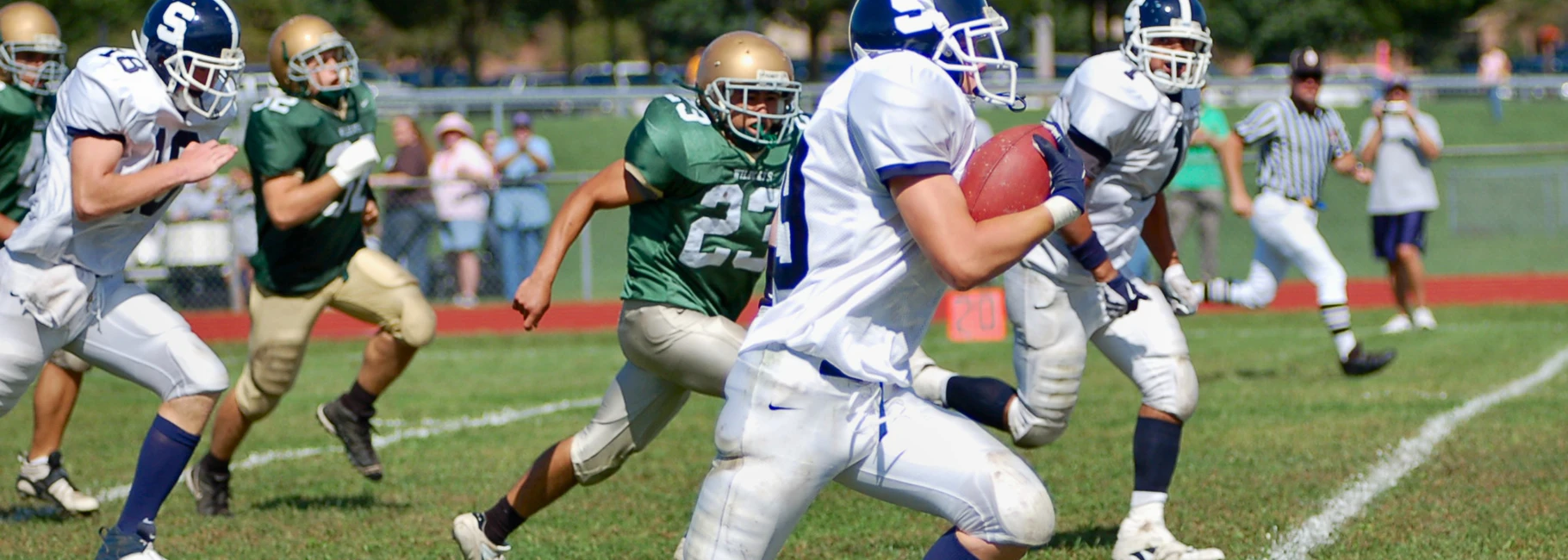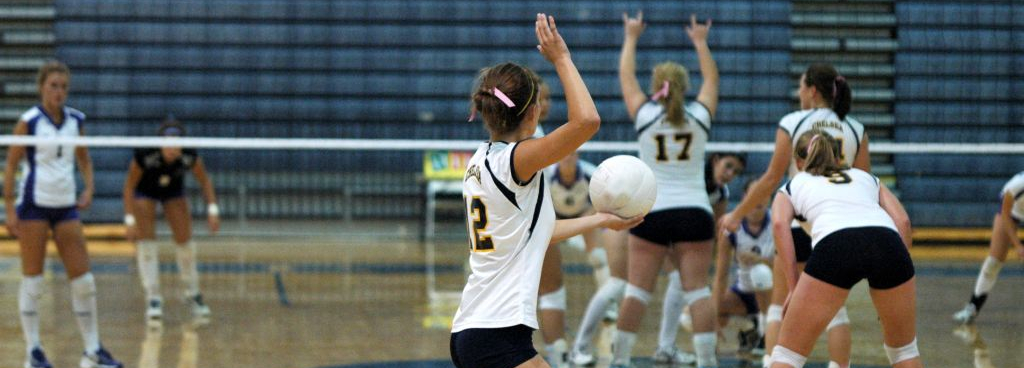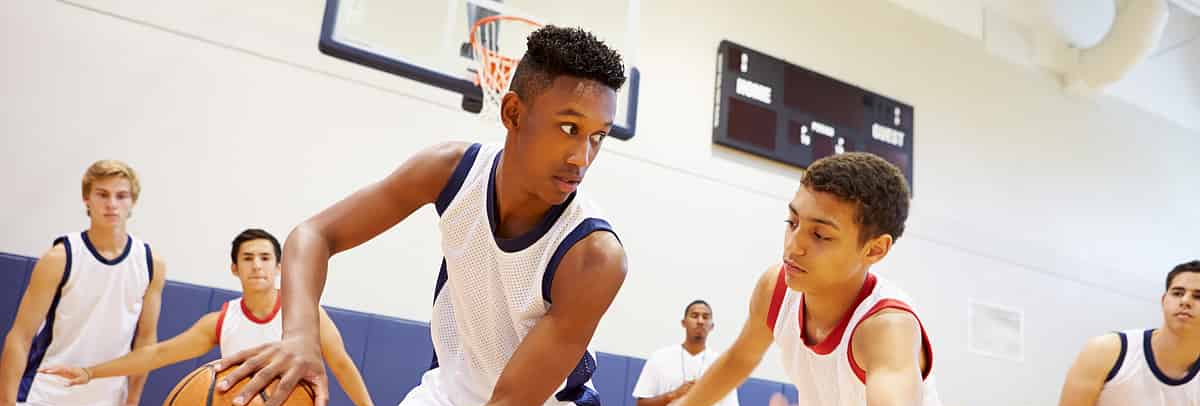Are you a high school athlete who dreams of continuing to play your sport at the collegiate level, whether it’s at a Division I, II, or III school? From football and basketball to swimming, baseball, softball, and more, there are a number of sports in which prospective student-athletes can be recruited to play at the next level, but it’s important to understand the basics of the athletic recruiting process before deciding if it’s an avenue you want to pursue.
Just as it is in the typical college search process, recruitment is a two-way street. Students need to learn everything they can about certain athletic programs and colleges to find the best fit, and those colleges need to market themselves so that students will be aware of their athletic offerings. A coach can’t build a team without engaged student athletes, and those athletes can’t be engaged without knowing the ins-and-outs of the formal recruitment process.
Here are some things that you should know before deciding if athletic recruitment is right for you.
College Divisions Explained
The NCAA (National Collegiate Athletic Association) is divided into three main divisions: Division I (D1), Division II (D2), and Division III (D3). Each division aligns with different philosophies and opportunities, allowing student-athletes to choose the best fit for their academic and athletic goals.
Division I
D1 schools are typically the largest and have the most extensive athletic programs. They offer the most athletic scholarships — sometimes this includes full scholarships that cover tuition, room, board, and other expenses. These college athletes perform at the highest level of competition, with rigorous training schedules and significant time commitments.
Examples of Division I schools include Duke University, Stanford University, the University of Alabama, UCLA, the University of Notre Dame, and The Ohio State University.
Division II
Generally smaller than D1 schools, D2 institutions still offer a high level of competition. Student-athletes may receive partial athletic scholarships, which can cover a portion of tuition and other expenses. Division II schools emphasize a balance between athletics, academics, and extracurricular activities.
Examples of Division II schools include Bentley University, California State University – Chico, University of Central Missouri, University of West Florida, Colorado School of Mines, and Barry University.
Division III
Schools in Division III are often smaller institutions with a focus on the overall college experience. While they do not offer athletic scholarships, many student-athletes receive academic or need-based financial aid. D3 schools have a philosophy that emphasizes participation, sportsmanship, and the integration of athletics into the educational experience.
Division III schools include Amherst College, Williams College, Johns Hopkins University, Emory University, Washington University in St. Louis, and the University of Chicago.
You Got a Letter from a Coach, Now What?
What ignites the college recruiting process for some students is the Flutie Effect — the desire to attend a school based on the success of its sports team. For others, it’s receiving a letter from a coach. Sometimes these letters are generic, and other times they can be handwritten and personal. It’s important to remember, however, that coaches and teams send out thousands of letters to high school athletes every year. Just because you get a letter from a coach, it does not mean you’re being actively recruited.
Think of them like college brochures. As soon as you took the SAT or ACT, your mailbox was full of them, right? The same applies to these initial letters. Many times, it’s just a marketing and sales tactic to get some athletes interested in a certain college. Remember, you are not being actively recruited until a coach calls you, invites you on a visit, or makes a formal offer to join the team.
Athletic Recruiting Doesn’t Happen on Social Media
Social media has revolutionized the college admissions process, and it’s had an even bigger impact on athletic recruitment. On the coach’s side, social media is a great way to reach prospective athletes with their program’s mission, goals, successes, and more. However, it has also added a complicated layer to the recruitment process in terms of who can and cannot have contact with certain athletes and when. Remember, just because someone says they’re a coach or a representative of a team on social media doesn’t necessarily mean they are.
Don’t take social media chatter seriously. Instead, use social media to learn more about a coach, the team, the school, and to promote yourself — and learn how to research a college effectively using other sources as well to get a more complete picture. Post photos and videos of your sporting events and keep your social media presence clean. Coaches have been known to stop recruiting certain athletes because of inappropriate or offensive posts on social media that were made by those athletes.
Coaches Won’t Always Come to You
There are nearly eight million high school athletes in the U.S., according to the most recent estimates. That’s a lot of students to keep up with, and it’s almost impossible for coaches to keep up with every athlete in their sport. If you’ve decided that playing your sport in college is a priority, it’s up to you to take control of the recruitment process.
- Talk with your high school coach to get a realistic evaluation of what level they think you could play in college.
- Seek guidance from your coach and school counselor on schools you think would be a good fit for your academic and athletic abilities.
- Get in touch with the coaches at these schools. Send a resume of your athletic achievements as well as game or tournament videos, if applicable.
- Become familiar with NCAA recruitment rules and timelines — they can vary from sport to sport!
- Register with the NCAA Clearinghouse/Eligibility Center so they can certify your eligibility to play college-level varsity sports.
These are just a few steps you can take to kick off your athletic recruitment process. If you’re unfamiliar with how to proceed, you can always seek help from college counselors with experience guiding athletes through the recruitment journey.
Athletic Recruitment Doesn’t Always Mean a Free Education
Many parents and students view college athletics as a ticket to a free education. While it’s true that many student-athletes receive scholarships, those are not always full rides. Division III athletic programs don’t offer scholarships at all. There are limits to the number of scholarships schools can offer to certain sports, and often they only cover a portion of the cost of attendance.
If you’re serious about athletic recruiting, you need to understand that you might not receive a full ride if offered a scholarship. And, if your main motivation for pursuing athletic recruitment is to receive a scholarship, you’ll need to be strategic about the teams which you target.
Athletic Ability Doesn’t Outweigh Academics
You may be a star athlete, but if you don’t have the GPA or test scores, there’s nothing a coach can do to guarantee your acceptance to the school. Even if you have an offer and a scholarship, you still must meet the college or university’s admission requirements. Perform well in your classes and reach the goal score needed on the SAT or ACT to improve your chances for admission. If you’re struggling, consider hiring a tutor or test prep expert to help you improve your academic standing.
Fit Matters
We can never stress the importance of college fit enough, and that applies to athletic recruitment, too. If you receive an offer from a successful program, but the team, school, or the coach is not a great fit for you, then it’s likely you won’t enjoy the experience. The same applies on the coach’s side. They want to recruit athletes who are a good fit and share the same values as their team and the school. If you’re able to recognize why a program is a good fit for you and demonstrate how you’re a good fit for the program, you’ll have a much more rewarding athletic recruitment experience.
Build Your Athletic Recruitment Plan with IvyWise
Navigating the college admissions process is difficult enough without adding the more complex layer of athletic recruitment. At IvyWise, we have several expert counselors who have extensive experience recruiting and guiding student-athletes through a step-by-step athletic recruitment plan. If applying to college as a recruited athlete is a priority for you, contact us today for more information on our services for student athletes.
Athletic Recruitment FAQ
How early should I start the recruiting process?
Starting the process as early as ninth or 10th grade can give you a head start. In ninth grade, focus on developing your athletic skills and maintaining a good academic performance. As a sophomore, you can start building an online recruiting profile and reaching out to college coaches.
What are the best ways to contact college coaches?
The most effective ways to reach out to a college coach include email, phone calls, letters and recruiting questionnaires, recruiting platforms, sports camps and showcases, and social media.
How to become a recruited athlete?
To become a recruited athlete, focus on maintaining good grades, improving your athletic skills, creating a strong recruiting profile with highlight videos, and actively reaching out to college coaches. Attend camps and showcases for exposure and stay organized throughout the process.
Do coaches actually look at NCSA?
Yes, many college coaches do use NCSA (Next College Student Athlete) to find and evaluate potential recruits. NCSA provides a platform where coaches can access a large database of recruits across 31 sports, making it a valuable tool for identifying talent.
What is the best recruiting site for sports?
NCSA, SportsRecruits, and CaptainU are all used by student-athletes, though each has different strengths.
How do I balance academics and athletics during recruitment?
Balancing academics and athletics during recruitment can be challenging, but it’s achievable with the right strategies. It’s important to manage your time well, stay organized, communicate with coaches and teachers, and take advantage of the academic and athletic resources and support offered at your school.




